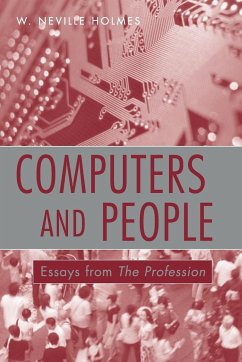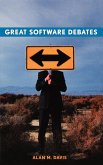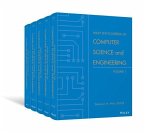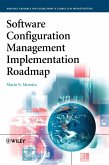Thought-provoking perspectives on how computers and people interact
This intriguing collection of essays and overviews presents new insights and perspectives into the roles that computers and digital technology have played and could play in society. The thirty-four essays were originally published in the IEEE Computer Society's flagship magazine Computer. The essays are grouped, each with a substantial overview and extensive discussion points, and all written by Neville Holmes, one of the foremost authorities in the field.
Computers and People has six main chapters:
_ The Basis of Computing considers what technology is, and why digital technology is particularly significant in today's world.
_ Computers So Far details how computers have been used and misused, questioning many common beliefs and practices.
_ Computers and Education argues that the greatest potential benefit of digital technology is in education, and examines reasons why this potential is ignored in so many areas.
_ Computing and Professions takes a close look at the nature and role of the computing profession, but brings out issues that are important to all professions.
_ The Potential of Computing suggests several ways in which digital technology might be used to greatly benefit different areas of society.
_ Facing the Future looks at the major problems facing the world and at how digital technology and computing professionals could help mitigate these problems.
The book is intended for anyone interested in learning more about the true nature and significance of digital technology. Not only will it instill a greater appreciation of the possible dangers and benefits of digital technology in our society, but it will also promote understanding of how much more digital technology could benefit society and what kind of professionals are needed to fully realize its potential.
Hinweis: Dieser Artikel kann nur an eine deutsche Lieferadresse ausgeliefert werden.
This intriguing collection of essays and overviews presents new insights and perspectives into the roles that computers and digital technology have played and could play in society. The thirty-four essays were originally published in the IEEE Computer Society's flagship magazine Computer. The essays are grouped, each with a substantial overview and extensive discussion points, and all written by Neville Holmes, one of the foremost authorities in the field.
Computers and People has six main chapters:
_ The Basis of Computing considers what technology is, and why digital technology is particularly significant in today's world.
_ Computers So Far details how computers have been used and misused, questioning many common beliefs and practices.
_ Computers and Education argues that the greatest potential benefit of digital technology is in education, and examines reasons why this potential is ignored in so many areas.
_ Computing and Professions takes a close look at the nature and role of the computing profession, but brings out issues that are important to all professions.
_ The Potential of Computing suggests several ways in which digital technology might be used to greatly benefit different areas of society.
_ Facing the Future looks at the major problems facing the world and at how digital technology and computing professionals could help mitigate these problems.
The book is intended for anyone interested in learning more about the true nature and significance of digital technology. Not only will it instill a greater appreciation of the possible dangers and benefits of digital technology in our society, but it will also promote understanding of how much more digital technology could benefit society and what kind of professionals are needed to fully realize its potential.
Hinweis: Dieser Artikel kann nur an eine deutsche Lieferadresse ausgeliefert werden.
"The 34 essays that comprise the heart if his book reveal a humans and judicious mind dedicated to raising his profession." (Times Higher Education Supplement, 23rd February 2007)
"This collection of timeless, thought-provoking essays will appeal to computer users of all levels and ages." (CHOICE, May 2007)
"The 34 essays that comprise the heart if his book reveal a humans and judicious mind dedicated to raising his profession." (Times Higher Education Supplement, 23rd February 2007)
"...I enthusiastically recommend these well-written essays as food for thought for computer professionals, teachers, students, and the interested general public." (Computing Reviews.com, February 1, 2006)
"The 34 essays that comprise the heart if his book reveal a humans and judicious mind dedicated to raising his profession." (Times Higher Education Supplement, 23rd February 2007)
"...I enthusiastically recommend these well-written essays as food for thought for computer professionals, teachers, students, and the interested general public." (Computing Reviews.com, February 1, 2006)








